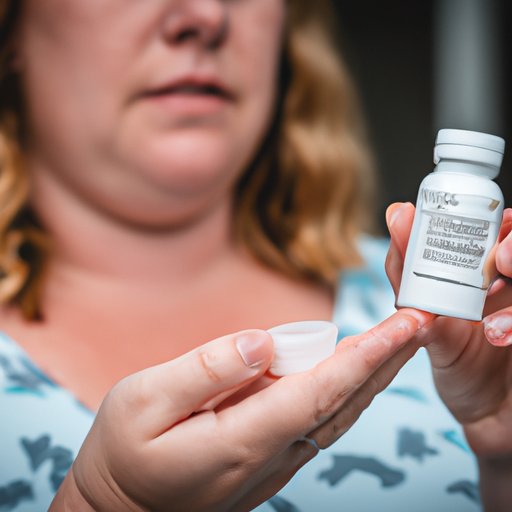
I. Introduction
As a new mom, you may be wondering if it is safe to take allergy medicine while breastfeeding. Allergy symptoms such as sneezing, coughing, and runny nose can cause discomfort and affect your ability to take care of your baby. However, it is important to understand the potential risks and benefits of allergy medication before taking them while breastfeeding.
II. The Lowdown on Allergy Medicine for Breastfeeding Moms: What You Need to Know
There are several types of allergy medication available, including antihistamines, decongestants, and nasal steroids. Antihistamines such as loratadine and cetirizine can relieve symptoms such as sneezing and runny nose. Decongestants such as pseudoephedrine can alleviate congestion. Nasal steroids like mometasone and fluticasone can help with nasal inflammation.
While some allergy medications are considered safe for breastfeeding moms, others may have potential risks. It is important to discuss with your healthcare provider about which allergy medication is safe for you and your baby before taking any medication.
III. Breastfeeding and Allergies: Tips for Safe Medication Use
Before taking any allergy medication while breastfeeding, it is important to seek medical advice. Your healthcare provider will evaluate your medical history, the severity of your allergy symptoms, and potential risks and benefits of the medication for you and your baby. Always follow the dosing instructions on the medication label and avoid taking more than the recommended dose.
It is also important to avoid certain allergy medications such as those containing pseudoephedrine during breastfeeding as it can decrease milk supply and affect your baby’s sleep pattern.

IV. Navigating Allergy Season While Breastfeeding: Your Guide to Medication
During allergy season, it can be challenging to avoid allergens that trigger your symptoms. However, there are some ways to manage allergies while breastfeeding. Avoid spending time outside during peak pollen hours, maintain good indoor air quality, and use air purifiers to filter out allergens.
If you do need to take allergy medication during allergy season, it is important to take them regularly as prescribed by your healthcare provider. Waiting until the symptoms become severe may lead to a decreased efficacy of the medication.
V. Breastfeeding and Allergy Relief: Do’s and Don’ts
When taking allergy medication while breastfeeding, there are some do’s and don’ts to keep in mind. Do take medication that is considered safe for breastfeeding moms. Do consult your healthcare provider before taking any allergy medication. Do follow the recommended dosing instructions.
Don’t take medication containing pseudoephedrine. Don’t take more than the recommended dose. Don’t take medication without consulting your healthcare provider. Don’t ignore potential side effects of medication.
It is also important to note that there are safe alternatives for allergy relief such as saline nasal spray and steam inhalation. These alternatives can relieve nasal congestion and soothe irritated sinuses without posing any risks to you or your baby.
VI. Allergy Medicine and Breastfeeding: A Comprehensive Guide
Here is a comprehensive guide on different types of allergy medication and how they can affect breastfeeding:
- Antihistamines such as loratadine and cetirizine are considered safe for breastfeeding moms as they have minimal transfer to breast milk.
- Decongestants such as pseudoephedrine should be avoided as it can decrease milk supply and affect your baby’s sleep.
- Nasal steroids such as mometasone and fluticasone are considered safe for breastfeeding moms as only a small amount is absorbed into the body.
VII. Allergy Meds and Nursing: What the Experts Say
According to the American Academy of Pediatrics, most allergy medications are considered safe to use during breastfeeding. However, it is important to weigh the potential risks and benefits of the medication for you and your baby. Consult with your healthcare provider before taking any medication.
VIII. Allergy Medication Use While Breastfeeding: Safety and Efficacy Considerations
While some allergy medication may pose potential risks to breastfeeding moms, it is important to weigh the efficacy of the medication against the potential risks. Untreated allergy symptoms may affect your ability to take care of your baby. By taking the medication as prescribed by your healthcare provider, you can alleviate allergy symptoms and maintain a healthy breastfeeding relationship with your baby.
IX. Conclusion
As a new mom, it is important to prioritize your health and well-being. However, it is equally important to understand the potential risks and benefits of any medication you take while breastfeeding. By seeking medical advice and following the recommended dosing instructions, you can safely manage allergy symptoms while maintaining a healthy breastfeeding relationship with your baby.
Empower yourself with knowledge so that you can make informed decisions about your health and the health of your baby.




